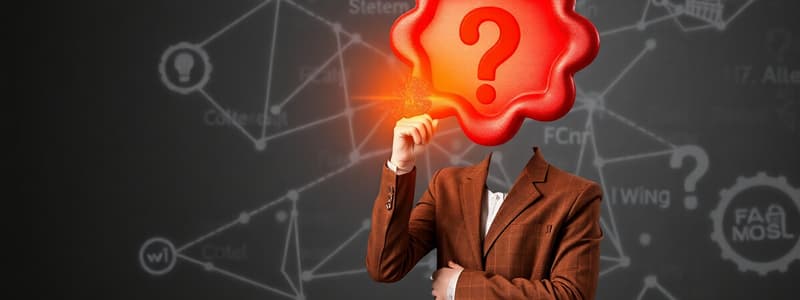Podcast
Questions and Answers
Which of the following is NOT a skill that helps develop critical thinking?
Which of the following is NOT a skill that helps develop critical thinking?
- Analysis
- Observation
- Judgment
- Intuition (correct)
How does empathy contribute to critical thinking?
How does empathy contribute to critical thinking?
- Empathy leads to more balanced decision-making by understanding various perspectives.
- Empathy allows for more effective communication and collaboration.
- Empathy helps individuals identify their own biases and preconceived notions.
- All of the above (correct)
What is the primary objective of building a foundational knowledge base in critical thinking?
What is the primary objective of building a foundational knowledge base in critical thinking?
- It improves the capacity for observational learning.
- It enhances the ability to anticipate counterpoints in debates.
- It provides a starting point for identifying personal biases.
- It helps to form a basis for rational decision-making. (correct)
What is the relationship between rational considerations and critical thinking?
What is the relationship between rational considerations and critical thinking?
How does critical thinking enhance work performance?
How does critical thinking enhance work performance?
What is a key component of developing critical thinking skills?
What is a key component of developing critical thinking skills?
What is a characteristic of a fixed mindset?
What is a characteristic of a fixed mindset?
Why is critical thinking considered versatile?
Why is critical thinking considered versatile?
Which aspect is NOT a part of practical decision making?
Which aspect is NOT a part of practical decision making?
What is likely to happen if a person remains calm while presenting their arguments?
What is likely to happen if a person remains calm while presenting their arguments?
Flashcards
Critical Thinking
Critical Thinking
The ability to analyze and evaluate information rationally.
Rational Considerations
Rational Considerations
Making judgments based on facts rather than emotions or opinions.
Empathy
Empathy
The ability to understand and share the feelings of another.
Identifying Knowledge
Identifying Knowledge
Signup and view all the flashcards
Ancillary Skills of Critical Thinking
Ancillary Skills of Critical Thinking
Signup and view all the flashcards
Persuasion
Persuasion
Signup and view all the flashcards
Emotional self-management
Emotional self-management
Signup and view all the flashcards
Practical Decision Making
Practical Decision Making
Signup and view all the flashcards
Fixed Mindset
Fixed Mindset
Signup and view all the flashcards
Study Notes
Critical Thinking
- Critical thinking is the ability to approach problems or situations using rational considerations.
- It requires analyzing all known information based on facts or evidence instead of opinions or emotions.
- Critical thinking often relies on empathy, the ability to view the world from someone else's perspective.
- This skill involves putting yourself in someone else's shoes, which improves teamwork and cooperation.
- Effective critical thinking requires extra effort to recognise what you know about a subject. This forms an initial knowledge base for consideration.
- When someone applies this approach to his or her own life, it emphasizes finding prejudices and preconceived notions. This helps in determining the cause of a problem and avoid emotional responses that could prevent self-improvement.
- Critical thinking is used in many situations, such as debates. Debate team members frequently use open-mindedness and empathy to help them work better with others.
Critical Thinking Skills
- Critical thinking involves the development of ancillary skills:
- Observation
- Analysis
- Reasoning
- Judgment
- Decision-making
- These skills improve accuracy and specificity in noting what is relevant and what is not.
- Critical thinking skills bring precision to the way you think and work.
Studying That Suits You
Use AI to generate personalized quizzes and flashcards to suit your learning preferences.




